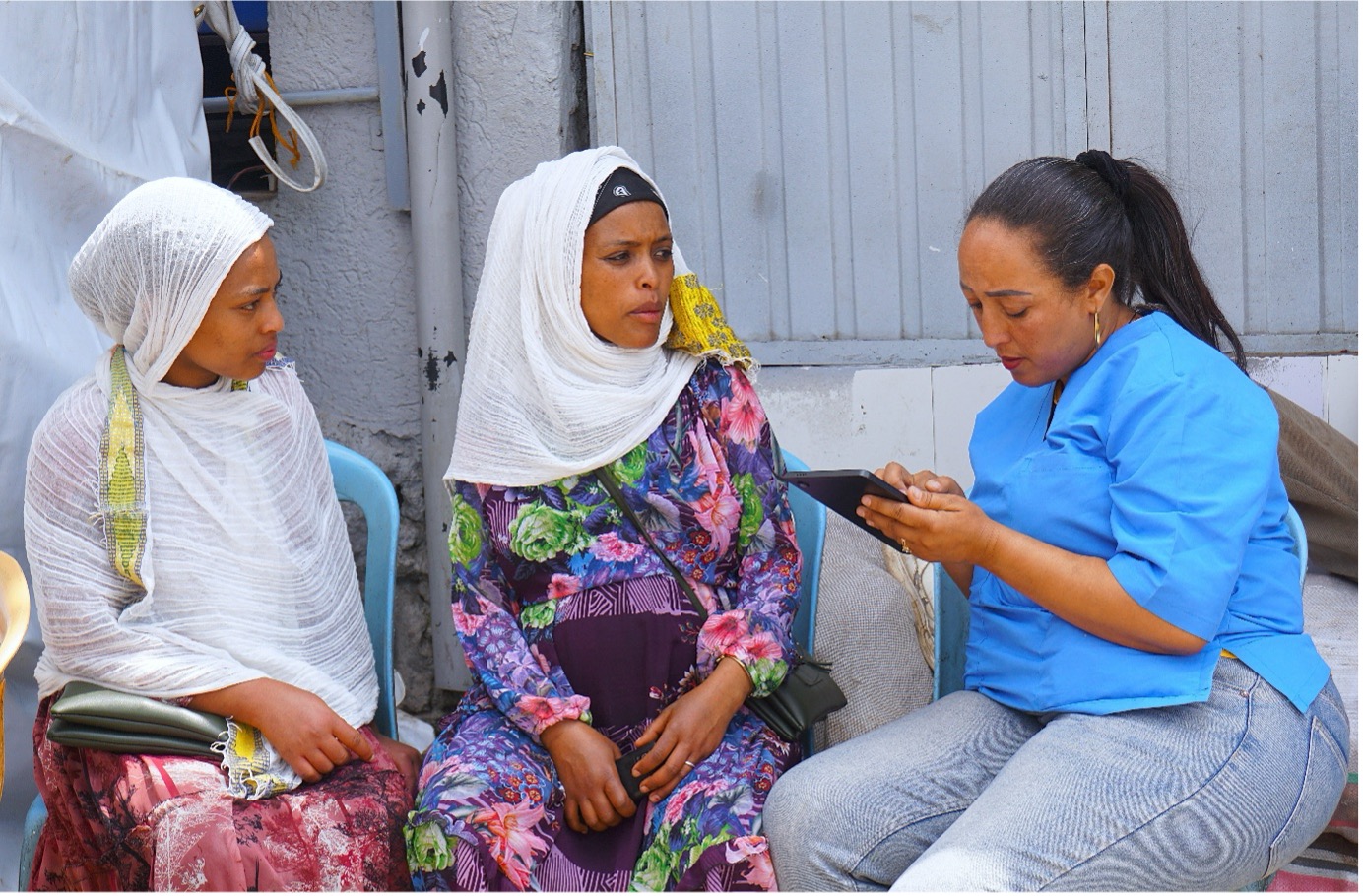Inside Ethiopia: Building a smarter system for early breast cancer detection
3 November 2025

Breast cancer remains one of the most common and deadly cancers affecting women across Africa. In Ethiopia, where many women live far from specialised health facilities, early detection has long been a challenge. But through the Cancer Care Africa initiative delivered by Global Health Partnerships (formerly THET) in collaboration with AstraZeneca and Spirit Health Foundation – new hope is emerging, one that combines digital innovation, community engagement and the dedication of frontline health workers.
This year’s global Breast Cancer Awareness Month theme, “Closing the Care Gap,” resonates strongly in Ethiopia. By training frontline health workers, introducing smarter digital tools and empowering community champions, this initiative is turning awareness into action, by helping more women detect breast cancer early and access the care they need.
Empowering the frontline
Since the start of the programme, over 75 Health Extension Workers (HEWs) have been trained to identify early signs of breast cancer, counsel women and use Clinitouch – a smart digital health platform that enables breast cancer screening, risk scoring, early detection and faster referrals to care.
The programme has transformed how health workers spot and respond to breast cancer. They’re now identifying warning signs earlier and referring women for diagnosis and treatment much faster. More than 35 Primary Health Workers (PHWs) have also been trained and equipped with Clinitouch to carry out confirmatory exams at primary health centres and ensure prompt referrals.
Together, this growing network is taking early screening beyond hospital walls – reaching women in their own communities and strengthening Ethiopia’s cancer care system from the ground up.
Tibebe Deribe, Senior Programme Manager, GHP Ethiopia said:
“The breast cancer training has substantially enhanced the knowledge, technical skills, and practical competencies of health workers. Consequently, notable improvements have been observed in community awareness, early screening, and the referral system for suspected breast cancer cases.”
Sr. Mekdes, Non-Communicable Disease (NCD) focal person at Kotebe Health Centre said:
“The training has greatly improved my knowledge and more importantly, helped me understand the significance of breast cancer screening. Since then, I have been actively engaged in awareness creation, screening and follow-up of community-based referrals. We now use the Clinitouch tool to streamline the process. I have also trained cancer champions, organised breast-examination corners and continuously motivate my colleagues to refer any suspected cases.”
Sr. Ileni, a Health Extension Worker, notes that the training has expanded her role from awareness to action:
“The tool we are using, Clinitouch, enables us to screen patients efficiently without using paper forms. It has greatly reduced our workload during household visits. Previously, my role was limited to awareness raising. Now, I have the knowledge and confidence to guide my community effectively and conduct screenings daily at the community level.”
These experiences show what happens when the right tools meet local expertise – health workers gaining confidence, communities feeling supported and more women being reached before it’s too late.
A smarter, digital approach
All trained HEWs and PHWs are now actively using Clinitouch. HEWs can use the Clinitouch app offline in areas with limited connectivity and it then automatically uploads data when connected to the internet. This ensures no woman is lost in the system and allows supervisors and staff at primary health centres to track progress in real time and make timely referrals for diagnosis and treatment.
To date, over 10,000 women have been screened for breast cancer through this initiative supported by Clinitouch. Behind this number are thousands of interactions, women learning to recognise early symptoms, asking questions and taking the first step toward care.
Community champions driving change
The programme also works beyond health facilities. More than 20 Cancer Support Champions, community influencers such as elders, women’s leaders and survivors have been trained to lead awareness sessions. These champions are helping to dismantle stigma, encourage early screening and strengthen trust between health workers and communities.
As Tibebe explains, integrating training with digital tools has improved service quality and strengthened sustainability through better coordination, accountability and community trust.
Challenges that remain
Despite remarkable progress, challenges persist. Many health workers still face difficulty convincing women to attend secondary screening appointments after initial assessments. Misconceptions and financial constraints continue to influence care-seeking behaviour.
“The main challenge in the screening and referral process is the community’s limited awareness and understanding of breast cancer,” explains Sr. Fikrie, a Health Extension Worker Team Leader at Kotebe Health Centre. “We face considerable difficulty convincing women to participate in screening due to myths and misconceptions. Some women respond positively and come for follow-up, while others decline. To address this, we’re planning secondary screenings at the household level to reduce referral gaps and raise awareness.”
Operational constraints also remain.
“Screening activities are constrained by limited resources,” adds Sr. Mekdes. “We are unable to screen all women attending the facility due to the lack of a separate examination room and dedicated staff. Kotebe Health Centre has a very high patient flow, we could reach far more women if we had adequate space and trained personnel.”
These reflections show that while digital tools and training have improved screening quality and coordination, achieving equitable and sustainable early detection still depends on continued investment in community education and health-system resources.
Towards a sustainable model
By combining digital innovation with human connection, the Ethiopia project is creating a smarter, more proactive system for cancer care. The partnership between Global Health Partnerships, Spirit Health Foundation and AstraZeneca is proving that even in resource-limited settings, early detection and referral are achievable when communities are empowered and health workers are equipped with the right tools.
As the programme expands, lessons from Ethiopia will continue to inform efforts across the continent, ensuring that more women can detect breast cancer early and access the care they deserve.


0 Comments
Leave a comment
Your email address will not be published.